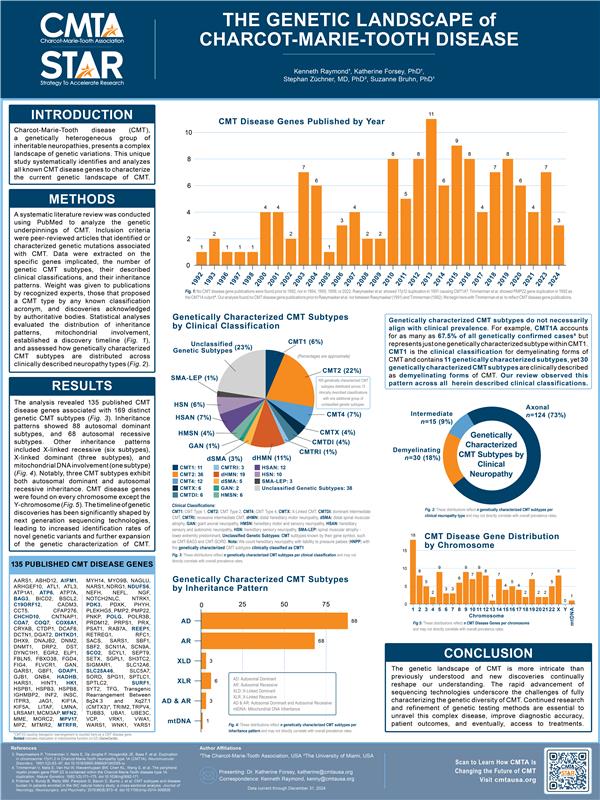The Charcot-Marie-Tooth Association (CMTA), the largest philanthropic funder of Charcot-Marie-Tooth (CMT) disease research, presented a new analysis of the genetic landscape of CMT at the 2025 Annual Meeting of the Peripheral Nerve Society (PNS).
The poster presentation, The Genetic Landscape of Charcot-Marie-Tooth Disease, highlights findings from a systematic review of all published CMT disease genes. Led by first author Kenneth Raymond, the study identified 135 published CMT genes associated with 169 distinct genetic subtypes. The review also categorized inheritance patterns across the disease, documenting 88 autosomal dominant subtypes, 67 autosomal recessive subtypes, six X-linked recessive subtypes, three X-linked dominant subtypes, and one subtype involving mitochondrial DNA.

The study highlights the complexity of CMT genetic classification and its disconnect from clinical classifications and subtype prevalence. For example, while CMT1A accounts for up to 67.5 percent of all genetically confirmed CMT cases, it is just one of 11 genetic subtypes within the clinical category of CMT1. The category itself is defined by demyelination, but demyelinating subtypes also appear in other classifications. In total, 30 genetically characterized subtypes of CMT are described as demyelinating. This pattern is seen across all of CMT.
“This analysis shows how far we’ve come in understanding the genetic diversity of CMT, while also pointing to how much work remains,” said Katherine Forsey, PhD, CMTA Chief Research Officer and presenting author. “The CMT community deserves both answers and solutions, and studies like this lay the foundation for both. They reflect the importance of continued genetic discovery and CMTA’s deep commitment to this work.”
CMTA’s genetic landscape analysis reflects more than just past discoveries. It underscores the urgent need to identify additional CMT-causing genes and better understand how known mutations affect individuals differently. One way community members can directly contribute to this ongoing work is by participating in research studies focused on genetic discovery and disease progression.
Participate in INC Study 6602: Genetics of Charcot-Marie-Tooth Disease
CMTA invites individuals to participate in the Inherited Neuropathy Consortium (INC) Study 6602, focused on uncovering new genetic causes of CMT. Led by CMTA’s Strategy To Accelerate Research (CMTA-STAR) Advisory Board member Stephan Züchner, MD, PhD, at the University of Miami, this study employs next-generation sequencing to analyze DNA from individuals with CMT, particularly those without a genetic confirmation. The research aims to identify new disease-causing mutations and genetic factors that influence disease severity, paving the way for targeted treatments.
Participate in INC Study 6601: Natural History Evaluation of Charcot-Marie-Tooth Disease
CMTA invites you to participate in the INC Study 6601, a natural history study that aims to understand how CMT progresses over time. This longitudinal study collects data through annual clinical evaluations, including neurological exams, nerve conduction studies, and health questionnaires. In a longitudinal study, researchers follow the same people over many years to understand how CMT changes over time.
By establishing a comprehensive natural history of CMT, this study provides essential baseline data that can be used to assess the effectiveness of future potential treatments. Participation is open to all individuals with CMT, with a special need for those with CMT1B, CMT2A, CMT4A, and CMT4C.
Register With Patients as Partners in Research Today
Not yet registered with CMTA’s Patients as Partners in Research? Sign up today to be among the first to learn about new CMT research opportunities for which you may be eligible. Registration also ensures you receive updates on the latest research news and developments.
Registration is free, and everyone with CMT is invited to participate.
Create Your Patients as Partners in Research Profile
Learn About CMTA’s Genetic Discovery Initiatives
Learn About CMTA’s Investment in CMT Diagnostics and Gene Discovery
Learn About CMTA’s Investment in Long-Read Genome Sequencing
Published on: May 19, 2025





